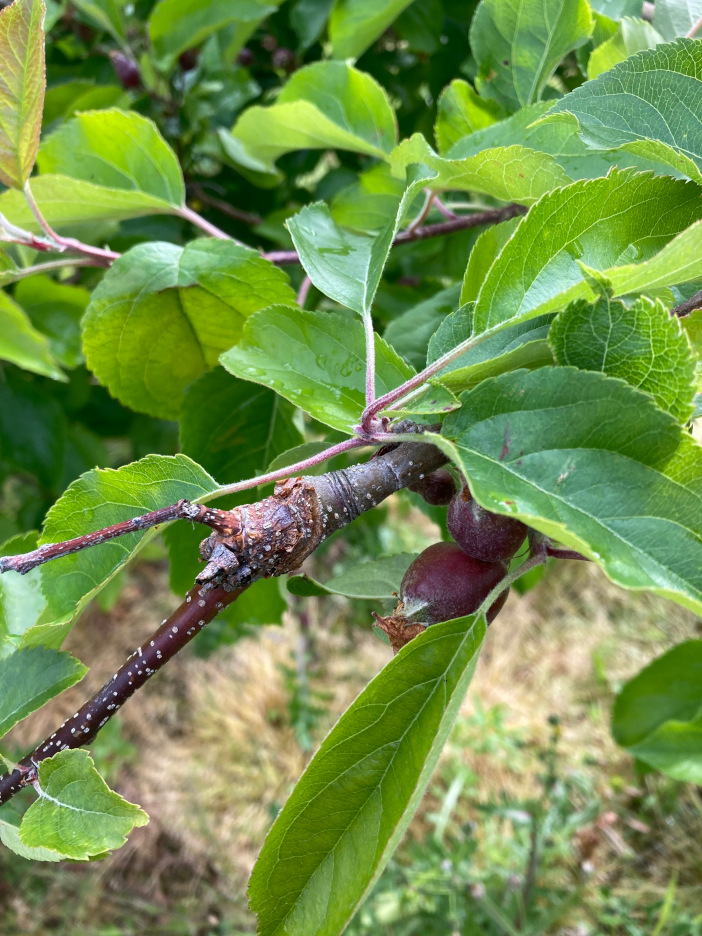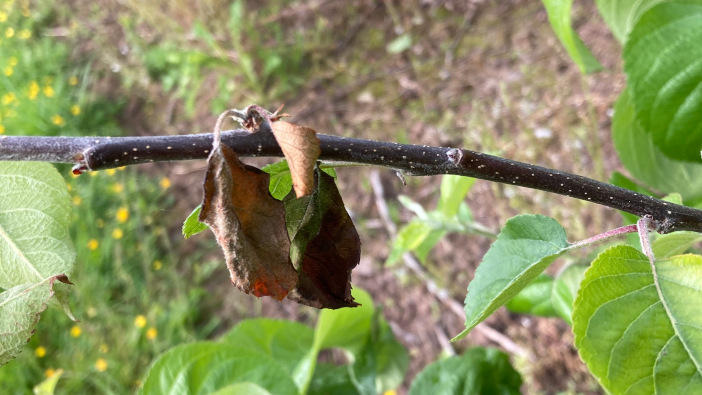As chemical controls for apple canker become more limited, Hutchinsons has been examining the effectiveness of some alternatives. The firm’s Canker Reduction in Apple Fruit Trees (CRAFT) trial is investigating whether elicitor products, growth regulators, foliar feeds or biological fungicides can be used to bolster the natural defences of apple trees.
The trial is taking place at a site in the West Midlands, close to the HELIOS West project (Hutchinsons Enhanced Light Interception Orchard System), an area chosen for its high apple canker risk.
Chris Baker of Fairfield Farm is kindly hosting the site and providing assistance to Hutchinsons agronomists Nigel Kitney and Rob Saunders, who are overseeing the project. Oxford Agricultural Trials (OAT) is responsible for daily management.

“The idea for the CRAFT trial was borne out of our project IRIS last year (Improving Robustness In Scab control), which used a range of similar products to enhance the natural defence mechanisms of apple trees against the scab pathogen Venturia inaequalis,” Mr Kitney explained.
“We’ve dropped a few products, but are testing many of the same ones as in IRIS, plus a few new options. It’s a bit of a long shot as to whether some will have any effect on canker, but we need to explore new solutions, and unless a company like Hutchinsons takes on this work, who else will?”
Mr Saunders added that canker is a complex disease that is endemic in apple trees, but chemical options for controlling it are quite limited. “Copper cannot be used, and the permitted rates and the maximum number of applications for tebuconazole have been reduced to a level that offers little protection in high-pressure situations, so it’s not something growers can rely on longer-term.
“SDHI fungicides, such as products based on boscalid + pyraclostrobin, are effective against canker, but they are not the whole answer. We really do need to find other effective control options.”
A total of 16 materials were applied at different timings last autumn to replicated plots of Gala Schniga. Each works slightly differently, with some applied to the ground to be taken up by the roots and others applied directly to the tree. Many were applied between the first and second picking, second and third picking, and/or at early leaf fall. Some with harvest interval restrictions could only be applied post-harvest.
“In the case of the growth regulators we trialled, post-harvest isn’t the usual timing for applying them, but the theory is that they may help reduce the sappiness of wood, making it less prone to new infection,” noted Mr Kitney.
Trees were left unpruned over the winter and canker lesions assessments were carried out in late May. The treatments are compared against an untreated control, as well as trees treated with the standard fungicide approach of captan plus tebuconazole applied post-harvest and during leaf fall.
“We’re only looking for new infections that have occurred since last autumn, so we can see if products have had any discernible effect,” said Mr Kitney. “It’s been a relatively dry season so far, which hasn’t been particularly conducive to high canker pressure, but we’re still analysing the results, and hope to be able to see some differences between the treatments applied.
“Most products we are looking at aren’t particularly expensive, therefore if they do offer a beneficial effect against canker, it should make them a viable option for growers to try in commercial situations in the future.”
Aside from boosting plant health, Hutchinsons suggests that there may be additional benefits from some of the options, by avoiding certain issues with applying conventional fungicides. For example, one treatment is applied through a trickle irrigation system, so if it is proven to reduce canker, there could be scope to reduce passes through the orchard with a tractor and sprayer.
Managing canker
- Canker is an airborne fungus that thrives in damp weather
- Fruiting lesions on wood produce spores that can infect other trees or flowers in spring
- Infected flowers lead to Neonectria fruit rot
- Pruning wounds are most susceptible to new infection. Picking wounds and leaf scars also act as important routes to infection
- Stress conditions, especially poor drainage and waterlogging, increase canker risk
- Mature orchards may tolerate some canker on scaffold branches, but impact is more damaging on new growth and young trees
- Removing infected material is the main way to materially reduce canker levels and prevent reinfection
- Existing chemical options are limited
- CRAFT project is exploring a range of potential alternatives to reduce canker risk, focussed on improving plant health and ‘biofortification’
- Results due later in the year
Growers will be able to learn more about improving orchard productivity when HELIOS West opens its doors to visitors on the 26th of July. The site is host to a range of trials, all centred around future-proof, cost-effective growing systems.
The sites, in Gloucestershire and Kent, also act as a testing ground for new digital technologies that could add another level of precision.
This year, HELIOS West is hosting a continuation of the IRIS scab trial, assessing similar products to last year, as well as some new options. Mr Kitney will be on hand at the July open day to discuss this work and the HELIOS project and provide further information on the CRAFT canker trial.


